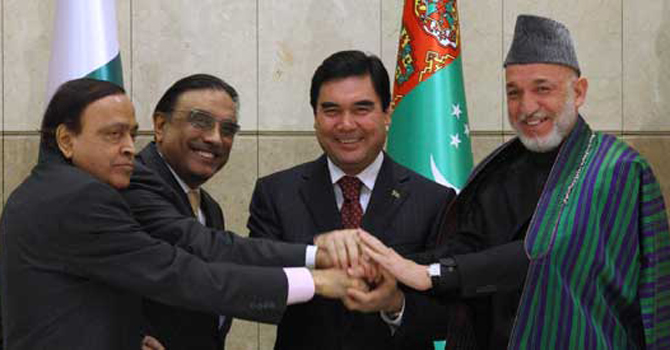AVAZA: Turkmenistan agreed on Wednesday to supply natural gas to Pakistan and India in deals that offer major economic benefits but depend on building and defending a US-backed pipeline across chronically unstable Afghanistan.
The route, particularly the 735-km leg through the Afghan provinces of Herat and Kandahar, will need billions of dollars in funding. It faces significant security problems as the Western Nato alliance plans to hand control of Afghanistan to Kabul’s own security forces by the middle of next year.
Turkmenistan’s state gas company Turkmengaz signed gas sales and purchase agreements with Pakistan’s Inter State Gas Systems and Indian state-run utility GAIL.
“The implementation of this project will give a powerful impetus to the social and economic development of all the participant countries,” Turkmen Deputy Prime Minister Baimurad Hojamukhamedov said before the signing ceremony in Avaza on the Caspian Sea.
India and Pakistan are both hungry for gas supplies and Turkmenistan, formerly part of the Soviet Union, is keen to free itself from reliance on gas exports to Russia.
Lilit Gevorgyan, analyst at IHS Global Insight, said that while the pipeline could be a lucrative commercial project, it would run through more than one high security risk country, “which puts the actual construction under a big question mark”.
The idea of the TAPI pipeline, an acronym formed from the initials of the four countries through which it would pass, was first raised in the mid-1990s but construction has yet to begin.
Turkmen officials have said the proposed 1,735-km pipeline could carry 1 trillion cubic metres of gas over a 30-year period, or 33 billion cubic metres a year.
Turkmenistan, a desert country of 5.5 million which borders Iran, is viewed by human rights bodies as one of the world’s most secretive and repressive countries.
But Turkmen President Kurbanguly Berdymukhamedov, who has a growing personality cult, has moved in recent years to warm ties with the West, whose political support and investment he needs to lay alternative gas export routes.
Security and costs
The major obstacle to the project is the stretch of pipeline that will run through Afghanistan. Nato set an “irreversible” course out of Afghanistan on Monday but US President Barack Obama admitted its plan to end the deeply unpopular war in 2014 was fraught with dangers.
A Nato summit in Chicago endorsed an exit strategy that calls for handing control of Afghanistan to its security forces next year but left questions unanswered about how to prevent a slide into chaos and a resurgence of the Taliban after allied troops are gone.
“Ultimately we believe that all the challenges, including security challenges that the project faces, can be managed or overcome,” Daniel Stein, senior adviser to the US State Department’s special envoy for Eurasian energy, told Reuters in Avaza on Wednesday. He did not elaborate.
But IHS Global Insight’s Gevorgyan wrote in comments to Reuters that “the project had a slim fighting chance in the past decade as Nato was still in Afghanistan”.
“With the Western troops’ pullout by 2014 from the still volatile Afghanistan, building an expensive pipeline in country with very weak central government seems almost unattainable.”
The Asian Development Bank said the TAPI pipeline was estimated to cost at least $7.6 billion in 2008. Analysts and officials now say it could cost between $10 billion and $12 billion to construct.
Strained ties between nuclear powers India and Pakistan is another source of concern.
“Given the animosity between the two countries, if TAPI is ever to be built it is likely to be a high-value target in Pakistan, where a number of religious fundamentalist groups will ensure that no energy supply enters India through their territory,” Gevorgyan wrote.
In Avaza, Pakistani Petroleum and Natural Resources Minister Asim Hussain showed optimism. “We will forget our past,” he said. “Let bygone be bygone and let’s move into the future.”
Turkmenistan is promoting TAPI as a key element in plans to boost annual gas exports to 180 billion cubic metres by 2030.
BP data show Turkmenistan’s natural gas reserves equal to those of Saudi Arabia and behind only Russia, Iran and Qatar.
The country aims to supply gas from its Galkynysh field, better known by its previous name, South Iolotan. Auditor Gaffney, Cline & Associates has ranked the field the world’s second largest, with gas reserves of between 13.1 trillion and 21.2 trillion cubic metres.
The Indian government said in a statement on May 17 that the pipeline would be operational in 2018. India and Pakistan would each get 38 million cubic metres per day (mcmd) of gas, while the remaining 14 mcmd would be supplied to Afghanistan, it said.
















































Dear visitor, the comments section is undergoing an overhaul and will return soon.